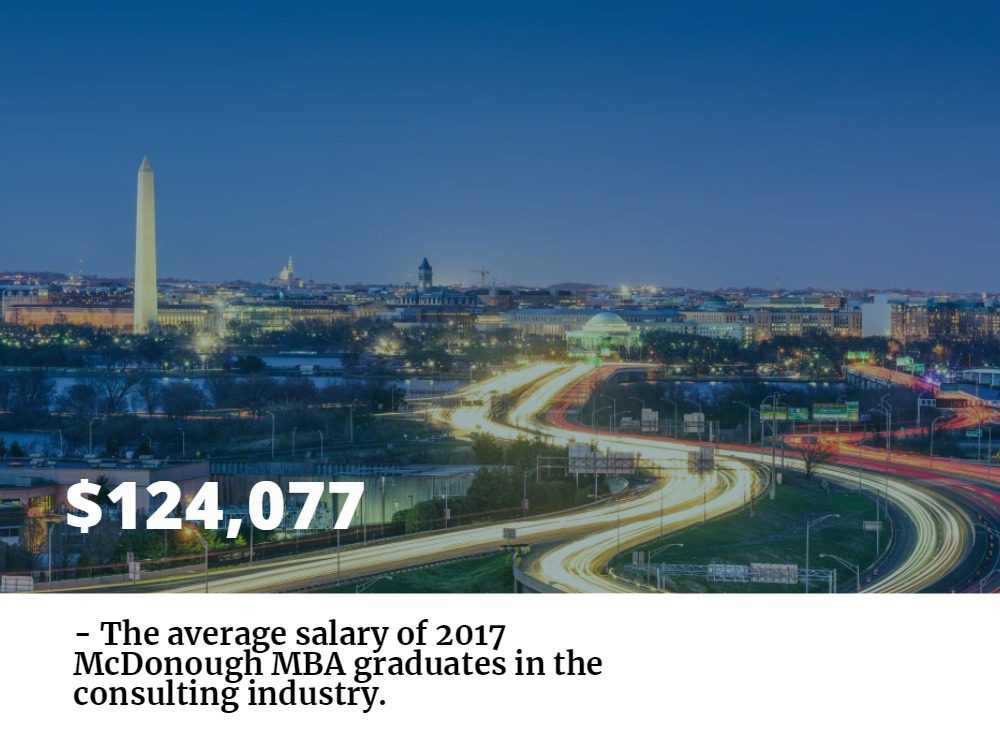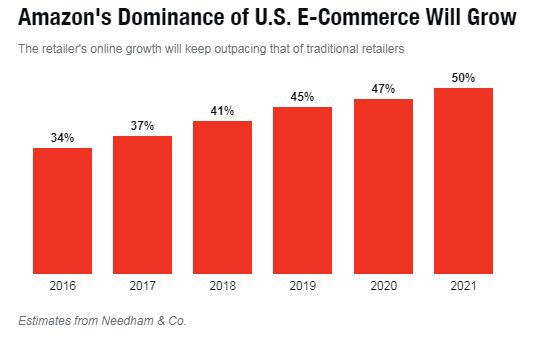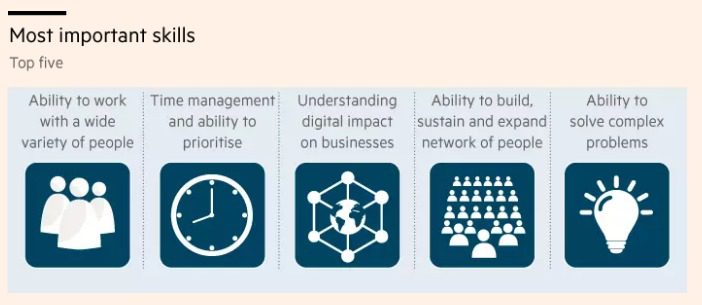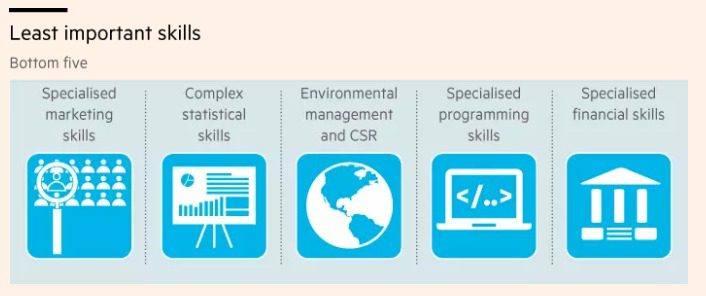Georgetown McDonough MBA Career Center Releases 2017 Employment Stats

No surprise: Georgetown MBAs are making bank!
According to the most recent employment report from the Georgetown University McDonough School of Business, the average starting salary for graduates was $112,501, which is a 4 percent increase from the previous year.
“Every year, we deepen our commitment to applying a personalized approach to our students’ job searches, and every year, the results exceed our expectations,” Doreen Amorosa, associate dean and managing director of the MBA Career Center, said. “From the expanded and customized approaches to the job search in the MBA Career Center to curricular offerings like our Executive Challenge, our MBA students are prepared to excel in their careers.”
Additionally, the report stated that the average signing bonus of recent McDonough graduates were $28,516, a 13 percent increase from last year. Job offers accepted within three months of graduation also rose from 90 to 92 percent.
The report provide some addition, equally interesting information. For example, the top four industries of choice for Georgetown McDonough MBAs are financial services (33 percent), consulting (28 percent), technology (13 percent), and non-profit/social impact sector (7 percent).
MBA graduates in the consulting industry are the highest earners among recent McDonough alums, pulling in over $124,000 annually, followed closely by those employed in the healthcare industry, which earned nearly $121,000 per year. In all, McDonough MBA grads included in the report earned lucrative positions at well-known companies, like Amazon, Bank of America, Barclays, Citi Group, Credit Suisse, Deloitte, EY, Google, PwC, and Verizon.

As far as internship data goes, 99 percent of first-year students secured an internship, with 85 percent of those paid positions. The average monthly compensation for internships was $6,501. Perhaps most impressive was that 81 percent of these internships were facilitated by the MBA Career Center, which is up 13 percent from 2016.
The Georgetown McDonough MBA Career Center is home to student organizations, Career Days and Treks, and on and off-campus networking events. The center partners with McDonough School of Business alumni to connect the future business leaders of America with today’s movers and shakers.
“We have invested in numerous strategic initiatives in recent years, including customizable search technologies, alumni mentoring tools, and offerings designed to individualize each student’s career outcomes,” Amorosa added in the press release. “Those, combined with our staff of certified career coaches and career curriculum that begins the summer before students arrive on campus, we equip our students with the strategies and experiences to be successful in their search.”
The Highest Paid MBA Starting Salaries in London

The draws of London may be too numerous to list: from a booming global economy to robust historic and cultural attractions, the city has a little something for everyone.
It’s likely no surprise that the city would take the sixth spot in The Atlantic‘s list of the “World’s Best Cities for Business, Life and Innovation.” While a number of factors were taken into consideration for creating the list, London’s ranking was likely boosted by its top spot in financial/business employment, and its 2nd overall spot in attracting job-creating foreign investment.
Such attributes make London an ideal spot for those pursuing or graduating with MBA degrees. As a center for global business, the opportunities for someone with the skills of an MBA are seemingly endless. However, the same vibrancy that attracts visitors across the world to London can make it an incredibly expensive city to live in from day-to-day, and those considering a move will need to consider both the cost of the city as well as earning potential.
Thankfully, London is home to some of the top MBA programs in the world, boosting the hireability and earning potential of graduates.
The Highest Paid London MBA Salaries
Saïd Business School – University of Oxford
Students at the Saïd Business School at the world-renowned University of Oxford take their education to countries around the world and into a wide variety of industries. Even considering the uncertainty brought to businesses in UK with the ‘Brexit’ referendum, the salaries of Oxford MBA graduates continue to rise from from the previous class to 2016 graduates. The average class salary for recent MBA grads at Saïd was £69,132, or $93,404 US—an increase of almost $13,000 from the previous year. These salaries varied slightly with industry, with salary averages for fields like finance and consulting reaching $96,273 and $98,458, respectively.
London Business School
With a staggering 96 percent of MBA graduates from London Business School accepting an offer within just three months of graduation, LBS graduates don’t need to wait long to start their dream job, with hopefully a salary to match. For MBA graduates of LBS, the average salary could range between £32,000 and £151,000, with the mean coming at an impressive £77,600. Salaries varied slightly between industries and also by region, with LBS graduates staying in the UK making slightly less than those venturing to North America.
READ MORE: “London Business School Launches More Flexible MBA”
Judge Business School—University of Cambridge
Graduates from the University of Cambridge Judge Business School will quickly realize the benefits of having such a well-regarded degree: about 92 percent of students from the graduating class received job offers within three months of earning their degree. The Cambridge MBA data also reveals the degree’s success in aiding those as they transition to a new career—98 percent of the 2015 graduating class switched either country, function, or industry sector just two years after graduating. The typical salary of Judge graduates increased greatly for the MBA class of 2015—likely a result of fluctuations in the pound after the Brexit decision—at a current average of £99,000, or, $133,792 USD.
Cass Business School—City University London
The Cass Business School at the City University London ranks among the top three schools for career development in the UK, a ranking reflected in the data of MBA graduates from the University. About 87 percent of MBA graduates reported a 53 percent increase in their salary. The average salary for MBA graduates at Cass is $99,000, with an even greater increase for those with an Executive MBA degree, at $130,000.
New Amazon Headquarters Bidding Race Begins, with 50,000 New Jobs on the Line

By October 19, bids for the newest Amazon headquarters (dubbed HQ2) will close. For the eCommerce giant, it’s another benchmark for an already historic year.
Following its outward commitment to more hiring and the landmark purchase of grocery store chain Whole Foods earlier this summer, Amazon just announced it will be establishing a new non-satellite headquarters outside of Seattle for the first time, which is expected to bring 50,000 jobs to a select city that bids for hosting duties. With the announcement, Amazon notes, “We are looking for a location with strong local and regional talent—particularly in software development and related fields—as well as a stable and business-friendly environment to continue hiring and innovating on behalf of our customers.”
In the six-page Request for Proposal form, which can be read here, Amazon notes a preference for North American cities that have the following:
- “Metropolitan areas with more than one million people.”
- “A stable and business-friendly environment.”
- “Urban or suburban locations with the potential to attract and retain strong technical talent.”
- “Communities that think big and creatively when considering locations and real estate options.”
Assuming Amazon does elect to build in a city with those population restrictions, there are only nine possible U.S. locations: New York City, Los Angeles, Chicago, Houston, Philadelphia, Phoenix, San Antonio, and Dallas. Three Canadian cities—Toronto, Montreal, and Vancouver—also hit the qualifying population figure.
In Philadelphia, Mayor Jim Kenney quickly announced the city’s intent to enter the bidding war. Chicago Mayor Rahm Emanuel also seems to be close to the effort. However, there may be reason to believe that Texas will be the eventually landing spot for HQ2, where 53-year old CEO Jeff Bezos spent much of his youth.
In a statement, Bezos said, “We expect HQ2 to be a full equal to our Seattle headquarters. Amazon HQ2 will bring billions of dollars in upfront and ongoing investments, and tens of thousands of high-paying jobs. We’re excited to find a second home.”
Local Economic Growth
Amazon notes that the host city will receive a boon beyond more lucrative job opportunities. In its announcement, the company, which employs nearly 400,000 people worldwide (not including short-term seasonal employees), detailed its financial impact in Seattle, which “resulted in an additional $38 billion to the city’s economy–every dollar invested by Amazon in Seattle generated an additional $1.40 for the city’s economy overall.”
As well, the company created more than 40,000 direct jobs in the Emerald City, and 53,000 additional jobs “as a result of Amazon’s direct investments,” according to the U.S. Bureau of Economic Analysis. In the Request for Proposal form, the company promises it “will hire as many as fifty thousand (50,000) new full-time employees with an average annual total compensation exceeding one hundred thousand dollars ($100,000) over the next ten to fifteen years, following commencement of operations.”
According to Wall Street firm Needham & Co., Amazon is expected to control 50 percent of all U.S. online sales by 2021. The ever-increasing market dominance has earned Amazon a fairly negative reputation, but has done little to deter growth.

Via Fortune
Seattle has also been witness to years of skyrocketing housing costs due to the immense economic growth. The Seattle Times notes “the median price hit $730,000, up nearly 17 percent from a year ago” for houses. Amazon and the rest of the Seattle corporate community may not be the only players responsible for the unusually high prices, but it is an inescapable part of the equation.
In a recent interview, Columbia Business School professor Rita McGrath said that Amazon may be looking for a location with less staggering housing costs.
“It’s hard to attract people if they can’t afford the housing available locally,” she said.
The Amazon MBA Impact
Last year, we highlighted Amazon’s massive effect on the MBA job market. The company creates a direct pipeline from its MBA internship program to full-time employment, which should rapidly increase with the creation of HQ2. In a previous interview with the Financial Times, Miriam Park, the Amazon Director of University Programs, highlighted the company’s recruitment strategy:
“The Amazon recruitment process is designed to ensure we hire top candidates with high-growth potential whatever their background may be. As part of this we recruit current MBA students and MBA alumni for permanent and internship opportunities worldwide and see MBAs as an important part of our leadership development. We value people who can balance long-term strategic thinking with tactical execution, and who have the ability to make data-driven decisions.”
The internship programs open opportunities for MBAs to join the company as senior product managers, operations analysts, and more. Throughout the Request for Proposal form, Amazon frequently reiterates its desire to build in a location that has a strong academic culture, writing, “a highly educated labor pool is critical and a strong university system is required.”
Amazon will formally announce where it will build HQ2 next year.
What Employers Do and Don’t Look for In An MBA Graduate

Earning an MBA can often be a huge boost for graduates entering the job market, from opportunities for upper-level management roles to increased salaries.
But securing that job post-graduation can still be an uphill climb. Even with an MBA, students often find themselves struggling to understand how they fit within a changing job market. As the market continues to shift, understanding exactly what employers are looking for in their MBA applicants—and what they aren’t looking for—can be crucial for graduates as they search for and apply for their perfect job.
Thankfully, a recent survey from the Financial Times looked at the job market from the perspective of employers: what they are in need of in terms of MBA job seekers, and how MBA applicants can be more realistic regarding for the roles for which their new degree will qualify them. Unfortunately for many MBAs, the survey results may come as a surprise when they reflect on what skills they hoped their degree would offer in the first place. Yet, a critical understanding of what employers are and aren’t looking for can help job seekers re-frame the way they understand themselves and their prospective careers.
What Employers Want
The survey looked into the most important skills that employers look for in new MBA talent. Perhaps surprisingly, the five most important skills determined by the survey were actually not core MBA subjects. “Soft skills,” such as the ability to prioritize (desired by 72 percent of employers), the ability to work with a variety of people (76 percent of employers), and the ability for employees to effectively manage their time were the most desired and difficult to find, according to the survey.
The most difficult skills to recruit—the skills companies are sorely in need of—were most commonly named as the ability to use social media for the business’ needs, financial forecasting, big data analysis, brand storytelling skills, and the ability to train others.

The five most important skills, according to the Financial Times survey.
What Employers Don’t Want
The least important skills for an MBA, according to the survey, were those most often thought of as “hard skills,” such as specialized skills in marketing, finance, programming, or complex statistical skills. Similar skills were mentioned as the least difficult skills to recruit—the ability to solve complex problems and specialized marketing skills are often seen as common fare among MBA graduates and therefore a candidate with such skills won’t necessarily stick out.
Many surveyed employers said that past experience with MBA-holding employees had left them disappointed, with the degree-holder having difficulty turning concepts into practice. Many employers said that, while an MBA degree may be a nice bonus for a job candidate, the overall hiring decision is more based on the individual’s industry qualifications, rather than their degree.

These skills may be less necessary than MBA grads anticipate.
What Do You Need To Do?
So far, the results of the Financial Times survey may be disappointing for MBAs who have worked hard for their business education. No need to get concerned just yet, however. The employer response may have less to do with the idea that the skills of an MBA grad aren’t necessary in a company and more to do with a perception gap; the belief that business schools will not teach students the skills they need, and therefore that they do not need MBAs at their company.
Most of the work in convincing a skeptical employer your degree is worthwhile is simply convincing them that the skills learned as part of your degree are the same ones they desire. Many business schools are attempting to change the way MBAs are perceived and the type of skills that are associated with graduates. Julie Morton, Associate Dean of Careers Services and Corporate Relations at Chicago’s Booth School of Business, has already set half of her team to the work of promoting the value of MBA-holders in the workforce. Overall, much of the work will fall on business schools to market their graduates as holding the skills most desired by recruiters.
On a more individual level, however, the survey results also indicate that MBA grads can be more judicious in the roles that they apply to and the way they market themselves to potential employers. By focusing on the skills desired most—and the hardest to recruit—and ensuring that employers know these are the exact skills an MBA education offers, both employer and employee can benefit.
Building a Career after Graduation: Columbia Business School

Huzzah! You made it through the b-school ringer! Now ready for the fun part? Finding a job!
Top MBA Recruiters: Finding A Role With PepsiCo

PepsiCo is one of the most well-known companies in the world. Known as a top manufacturer, marketer, and distributor of soft drinks and snack foods, the company also serves as a top recruiter of MBA talent in the United States. Continue reading…
